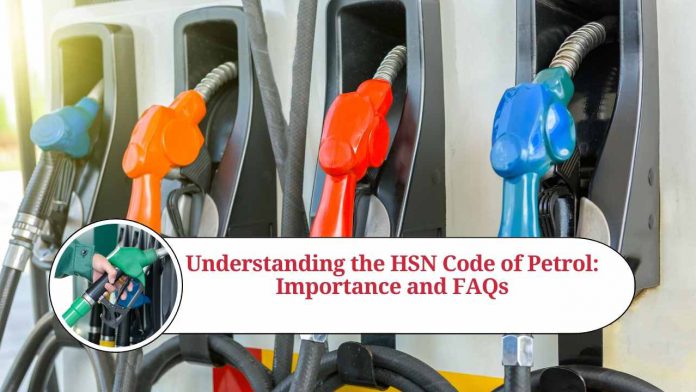Understanding the HSN Code of Petrol
Petrol, also known as gasoline, is a widely used fuel that powers many vehicles and machinery. As a commodity, it is important to classify it under the correct HSN code to ensure smooth trading and compliance with tax laws. In this blog, we will discuss the HSN code of petrol in detail.
What is HSN Code?
The Harmonized System of Nomenclature (HSN) is an internationally accepted system of product classification. It is used to classify goods based on their nature, form, and use. HSN codes are used for taxation purposes, customs clearance, and statistical analysis of trade. Each product is assigned a unique six-digit code under the HSN system.
HSN Code of Petrol
Petrol falls under Chapter 27 of the HSN system, which covers mineral fuels, mineral oils, and products of their distillation. The HSN code for petrol is 2710. Petrol is classified under subheading 2710.11 which specifies gasoline, leaded or unleaded.
Let’s break down the HSN code of petrol:
- 27: This refers to Chapter 27, which covers mineral fuels, mineral oils, and products of their distillation.
- 10: This refers to the heading of petroleum oils and oils obtained from bituminous minerals, crude.
- 2710: This refers to the subheading of petroleum oils and oils obtained from bituminous minerals, refined or not, but not further prepared.
- 2710.11: This refers to the subheading of gasoline, leaded or unleaded.
Importance of Proper HSN Classification
Proper classification of products under the HSN system is crucial for various reasons. For one, it ensures that the correct tax rates are applied to the product. Different products may have different tax rates based on their HSN codes. Additionally, proper classification ensures compliance with customs regulations, making the import and export process smoother. HSN codes also provide a standardized system for statistical analysis of trade data.
Importance of HSN Code for Businesses
HSN codes are important for businesses engaged in the production, sale, or import/export of goods. In addition to complying with tax and customs regulations, HSN codes help businesses in the following ways:
- Easy Identification of Products: HSN codes provide a unique identification number to each product. This makes it easier for businesses to identify and classify their products correctly. This also helps in reducing errors and disputes related to product classification.
- Avoidance of Penalties: Incorrect classification of goods can lead to penalties, fines, and legal issues. HSN codes help in avoiding such issues by ensuring that products are classified correctly.
- Taxation and Pricing: Different goods may attract different tax rates based on their HSN codes. HSN codes also help in determining the correct price of goods, especially in cases where the pricing is based on weight or quantity.
- Data Analysis: HSN codes provide a standardized system for collecting and analyzing trade data. This helps businesses in identifying market trends, analyzing competition, and making informed decisions.
In the case of petrol, proper classification under the HSN system is crucial due to its widespread use and impact on the economy. The correct HSN code ensures that the correct tax rate is applied and helps in avoiding legal and financial complications.
Conclusion
The HSN code of petrol is 2710.11 under Chapter 27 of the HSN system. Understanding the HSN code system and correctly classifying goods is crucial for businesses engaged in the production, sale, or import/export of goods. HSN codes provide a standardized system for identifying and classifying goods, ensuring compliance with tax and customs regulations, and facilitating data analysis. It is essential to ensure that the correct HSN code is used for petrol to avoid any legal or financial complications.
Read more useful content:
Frequently Asked Questions (FAQs)
- What is an HSN code?
An HSN code is a unique six-digit code used to classify goods based on their nature, form, and use.
- Why is the correct HSN code important for petrol?
The correct HSN code is important for petrol because it ensures that the correct tax rate is applied and helps in avoiding legal and financial complications.
- What is the HSN code of petrol?
The HSN code of petrol is 2710.11 under Chapter 27 of the HSN system.
- What does subheading 2710.11 specify?
Subheading 2710.11 specifies gasoline, leaded or unleaded.
- What is the importance of HSN classification for businesses?
HSN classification is important for businesses because it ensures compliance with tax and customs regulations, helps in avoiding penalties and legal issues, and facilitates data analysis.
- What is the penalty for incorrect HSN classification?
Incorrect HSN classification can lead to penalties, fines, and legal issues. The penalty varies depending on the severity of the offense.
- Is the HSN code of petrol the same in all countries?
The HSN code of petrol may differ slightly in different countries, but it is generally classified under Chapter 27 of the HSN system.
- How can businesses ensure the correct HSN classification of their products?
Businesses can ensure the correct HSN classification of their products by consulting with experts, using online HSN code databases, and keeping up-to-date with changes in HSN codes.
- What are the benefits of using HSN codes for statistical analysis?
Using HSN codes for statistical analysis helps in identifying market trends, analyzing competition, and making informed decisions.
- How often are HSN codes updated?
HSN codes are updated periodically to reflect changes in the nature, form, and use of goods. Businesses should keep up-to-date with these changes to ensure compliance with tax and customs regulations.




















